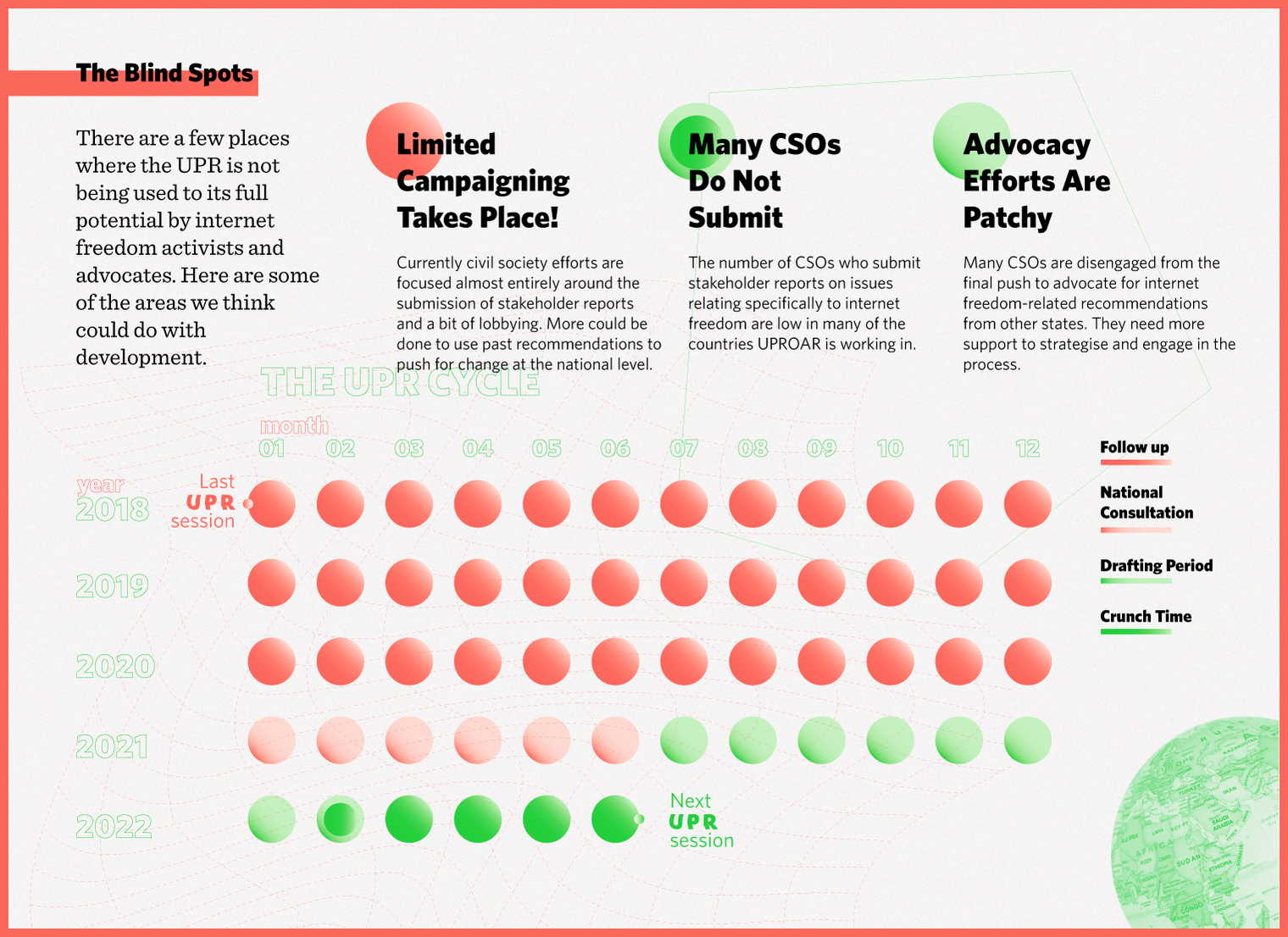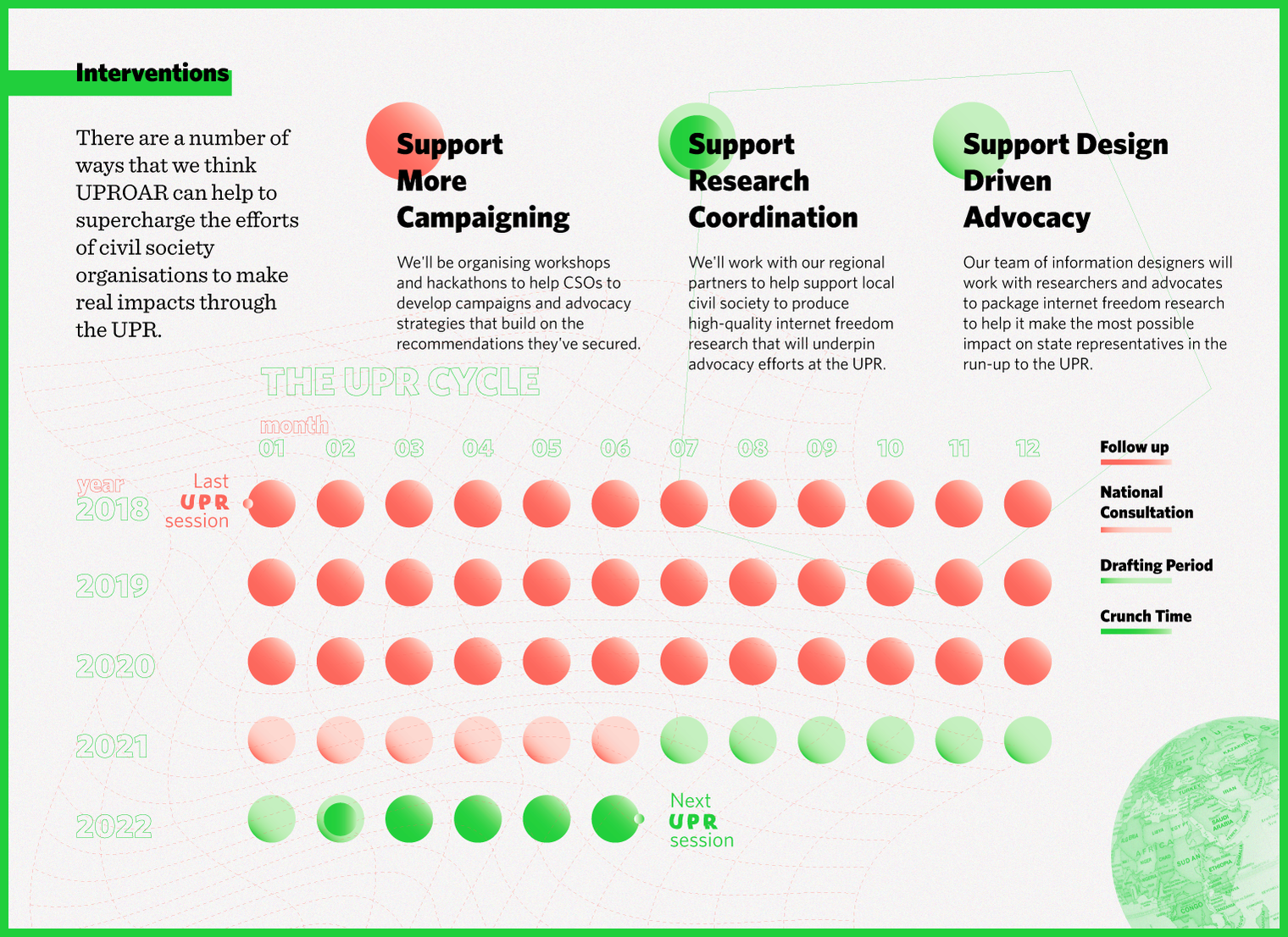UPROAR —Engaging With the Universal Periodic Review
In this blog, we talk a little bit about what the UPR is, and how we’re hoping to use it to boost digital rights globally. Get involved!
James Marchant, Small Media
September 24, 2018
In our last blog, we introduced our new project UPROAR, which aims to push internet freedom to the top of the agenda at the Universal Periodic Review, and to help internet freedom advocates to use the process to deliver real change.
Check out our previous blog for all of that background. But I think when we left off, we were just about to answer another question?
Yes! We were asking what UPROAR was actually aiming to do? How can you help civil society to get involved in the UPR, and what are you offering?
Okay! As we were saying, the UPR is a lengthy and complicated process, and there are so many different ways that civil society can get engaged. So we wanted to understand all of this before we started.
First off, we decided to map out the different phases of the UPR process, and to think about the wasted opportunities and ‘blind spots’ in civil society organisations’ existing work.
Here are the blind spots we spotted:

Okay, so you’ve talked a lot about the problems. But how can we fix them?
There are a bunch of things we can do. The UPR is such a long and complex process, but we think there are three main interventions we can make to help internet freedom organisations and activists make their mark. Here they are:

Supporting More Campaigning
It’s important not to lose sight of the recommendations made to states in the previous cycle — if your state has promised to implement certain measures to protect freedom of expression and access to information online, then you shouldn’t let them forget about it!
We want all the local organisations we work with to feel confident and empowered to develop a four-year advocacy plan to engage with and build on successes at the UPR, and UPROAR will offer a series of workshops to support this.
UPROAR’s first advocacy training workshop will take place immediately before the Forum on Internet Freedom in Africa 2018 in Accra, Ghana.

We’ll also be hosting a series of DATA4CHANGE workshops over the course of UPROAR to supercharge these advocacy plans, and produce some powerful data-driven digital rights campaigns. Keep an eye on the DATA4CHANGE site for more details about these opportunities as they’re announced.
Support Research Coordination
If we want to get digital rights policy recommendations to the floor during the UPR sessions, then it’s absolutely crucial that, in partnership with a broad range of local voices, we can develop a strong knowledge base about the urgent digital rights challenges facing our target states.
We want to work with digital rights organisations in our target states (and other local civil society organisations who view digital rights as a priority!) to comprehensively document the internet freedom challenges experienced by citizens, activists and journalists.
We’ll support civil society organisations to submit evidence to the UPR process, and to use it to influence diplomats to make digital rights challenges a priority in their recommendations.
Support Design-Driven Advocacy
If we want to influence governments to make internet freedom a priority, then it’s not just important to do the research, but to share it with them in a digestible and useful way. Diplomats don’t have time to read 30-page reports, and they often don’t know all that much about the countries they’re writing recommendations for. So it’s crucial that advocates can deliver their messages in a concise and immediate way.
This is why UPROAR will be deploying our team of information designers to help advocates communicate their key messages and research findings to key advocacy targets in the run-up to the review. We’re also looking to support the very best advocates to travel to Geneva in the run-up to their country’s review, so they can make the case in-person for internet freedom to be prioritised.
Great! I’m in! How can I get involved?
Perfect! No matter how ready you feel to get engaged in the process, we want to hear from you, and to start a conversation about how you can use the UPR to drive meaningful change at home.
Check out the rest of our website and register your interest in the programme using the contact form. Once you’ve submitted a few basic details about your background, your organisation (if you have one), and the change you want to achieve, we’ll be in touch to have a conversation about how we can support you.
The UPR can be a powerful tool for bringing about change — but only if civil society engage with it. So if you feel passionate about internet freedom, please don’t miss this opportunity! We’ll be here to support you every step of the way.